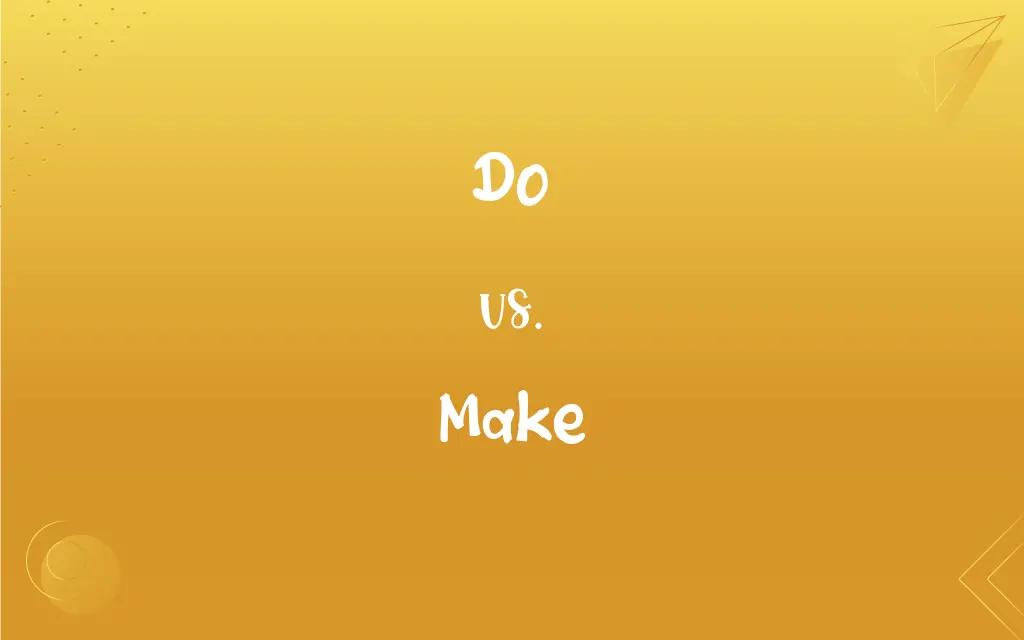Do vs. Make: What's the Difference?
Edited by Aimie Carlson || By Janet White || Published on November 8, 2024
"Do" implies performing actions or tasks, while "make" involves creating or producing something.

Key Differences
In the English language, "do" and "make" are both verbs that often confuse learners due to their seeming interchangeability. However, their usage is distinct in various contexts. "Do" generally refers to performing actions, tasks, or duties. It is used when talking about general actions without specifying what is being done. On the other hand, "make" is used to denote the creation, production, or formation of something. It is associated with bringing something into existence.
The difference between "do" and "make" also extends to their usage in expressions and idiomatic language. "Do" is often used in a broad sense, covering activities in general, such as "do good" (where the action is abstract) or "do the dishes" (where the action is specific but routine). In contrast, "make" is used in contexts where there is an end product or result, such as "make a decision" or "make a promise," emphasizing the creation of a commitment or choice.
"Do" is used in questions and negatives to talk about actions in general, without specifying the nature of the action. For example, "Did you do anything today?" Here, "do" is used because the specific actions are not mentioned. Conversely, "make" is used when referring to specific activities that result in something being created, such as "She made a cake for her birthday."
"Do" can function as an auxiliary verb in questions and negations, playing a grammatical role without carrying meaning itself, such as in "Do you like it?" Meanwhile, "make" cannot serve as an auxiliary verb and is always used with its primary meaning of creation or production.
Comparison Chart
General Usage
Actions, tasks, or activities without a physical product.
Creating, producing, or forming something with a tangible outcome.
ADVERTISEMENT
Examples
Do homework, do a job, do a favor
Make a cake, make a plan, make a promise
Idiomatic Expressions
Do well, do good, do your best
Make a difference, make money, make friends
Auxiliary Usage
Used as an auxiliary verb in questions and negatives.
Not used as an auxiliary verb.
Focus
On the action itself or the process of performing.
On the outcome or the product of the action.
Do and Make Definitions
Do
To perform an action or task.
I need to do my laundry.
ADVERTISEMENT
Make
To create or produce something.
She will make dinner tonight.
Do
To fare or perform in a specified manner.
He did well on his exam.
Make
To cause to exist or happen.
He makes trouble everywhere he goes.
Do
To solve or work out.
Can you do this math problem?
Make
To arrange or prepare.
Can you make the bed?
Do
To fulfill a duty or role.
She does her part in the group project.
Make
To earn or acquire money.
She makes $50,000 a year.
Do
To travel or cover a particular distance.
We did 100 miles on our road trip.
Make
To reach or manage to arrive in time.
Did you make the train?
Do
To perform or execute; carry out
Do one's assigned task.
Do a series of business deals.
Make
To cause to exist or happen; bring about; create
Made problems for us.
Making a commotion.
FAQs
When is "make" the correct choice?
Use "make" when talking about creating, producing, or forming something tangible.
Why is "make" used with expressions like "make a decision"?
Because it involves the creation of a choice or outcome.
Is "do" used with specific activities?
"Do" is often used with broad or abstract activities, not specific creations.
When should I use "do"?
Use "do" when referring to general actions or tasks without specifying the end product.
Can "do" and "make" be used interchangeably?
No, their usage depends on the context: "do" for actions, "make" for creation.
Is "make" ever used as an auxiliary verb?
No, "make" retains its meaning of creation or production and is not used as an auxiliary verb.
How do idiomatic expressions differ between "do" and "make"?
"Do" expressions often relate to performance or behavior, while "make" expressions usually involve creation or effect.
Can "do" be an auxiliary verb?
Yes, "do" is used as an auxiliary verb in questions and negatives.
Is "do" used with everyday tasks?
Yes, "do" is commonly used for routine or general tasks like "do the dishes."
Can "do" refer to creating something?
Typically, "do" refers to the action itself rather than the creation of a tangible product.
Why is "make" used in "make a cake"?
Because it involves producing something tangible (a cake) as a result of the action.
How does context affect the choice between "do" and "make"?
The context of action versus creation typically guides the choice between "do" and "make."
How is "make" used in business language?
"Make" is often used to discuss production, earnings, and outcomes in a business context.
Can the use of "do" or "make" change the meaning of a sentence?
Yes, choosing between "do" and "make" can significantly change the focus from action to creation.
What does "make" imply in "make friends"?
It implies the process of creating friendships, focusing on the result of having friends.
Is "do" related to the process or the outcome?
"Do" is more about the process or act of doing something rather than the outcome.
Are there exceptions to the usage rules of "do" and "make"?
Yes, idiomatic expressions may not always follow the general usage rules.
Can "make" indicate success in an endeavor?
Yes, phrases like "make it big" imply success in creating a certain status or achievement.
Can "do" and "make" be part of fixed phrases?
Yes, both verbs are often found in fixed phrases and idioms with specific meanings.
What role does "do" play in questions?
"Do" is used as an auxiliary verb to form questions about general actions.
About Author
Written by
Janet WhiteJanet White has been an esteemed writer and blogger for Difference Wiki. Holding a Master's degree in Science and Medical Journalism from the prestigious Boston University, she has consistently demonstrated her expertise and passion for her field. When she's not immersed in her work, Janet relishes her time exercising, delving into a good book, and cherishing moments with friends and family.
Edited by
Aimie CarlsonAimie Carlson, holding a master's degree in English literature, is a fervent English language enthusiast. She lends her writing talents to Difference Wiki, a prominent website that specializes in comparisons, offering readers insightful analyses that both captivate and inform.







































































